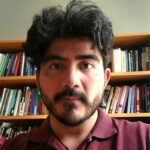January 10, 2024
The Stone Center has selected seven Ph.D. students as Junior Scholars for the 2023–2024 academic year. Each student will receive $5,000 in funding to help support their research on topics related to socio-economic inequality and will participate in the Stone Center’s activities, including its seminar series and events.
This year’s Junior Scholars specialize in areas such as applied social psychology, environmental economics, and comparative politics, adding to the diversity of research interests and perspectives at the Stone Center.
2023–2024 Junior Scholars
 Christos Angelopoulos (Economics) focuses on exploring the dynamic relationship between wealth inequality and financial markets with specific emphasis on the financial derivatives market. Before starting his Ph.D. studies, he worked in the finance industry, including positions in risk management and investments. Angelopoulos has taught classes in statistics, finance, and econometrics. He holds a B.A. in Economics from the University of Piraeus, Greece, and a M.Sc. in Finance from Stony Brook University. Angelopoulos plans to use the funding to access data from sources such as the Chicago Mercantile Exchange.
Christos Angelopoulos (Economics) focuses on exploring the dynamic relationship between wealth inequality and financial markets with specific emphasis on the financial derivatives market. Before starting his Ph.D. studies, he worked in the finance industry, including positions in risk management and investments. Angelopoulos has taught classes in statistics, finance, and econometrics. He holds a B.A. in Economics from the University of Piraeus, Greece, and a M.Sc. in Finance from Stony Brook University. Angelopoulos plans to use the funding to access data from sources such as the Chicago Mercantile Exchange.
Aman Desai (Economics) researches the intersection of inequality of opportunity and intergenerational income mobility, and their implications for public policy. His dissertation aims to incorporate dynamic complementarity in skill acquisition into the measurement of inequality of opportunity, with the goal of advocating for early-life investment in human capital. Desai holds an M.S. in Econometrics and Quantitative Economics from SUNY Buffalo. He plans to use the funding to support his work as he writes his dissertation.
 Juan Diaz (Social Welfare) focuses on the immigrant experience of the Ecuadorian community in New York City. His research examines the socio-economic and structural barriers faced by first-generation Latinx immigrants, and the policy alternatives that could foster social capital and increase upward mobility among first-generation children and youth. Diaz is also a Guaranteed Income Research Fellow at the University of Pennsylvania, and holds a B.A. in Sociology and an M.S. in Urban Policy and Leadership from Hunter College. He plans to use his funding for survey and data analysis costs, transcription and translation tools, and transportation costs.
Juan Diaz (Social Welfare) focuses on the immigrant experience of the Ecuadorian community in New York City. His research examines the socio-economic and structural barriers faced by first-generation Latinx immigrants, and the policy alternatives that could foster social capital and increase upward mobility among first-generation children and youth. Diaz is also a Guaranteed Income Research Fellow at the University of Pennsylvania, and holds a B.A. in Sociology and an M.S. in Urban Policy and Leadership from Hunter College. He plans to use his funding for survey and data analysis costs, transcription and translation tools, and transportation costs.
 Oswaldo Mena Aguilar (Political Science) focuses on comparative politics, political economy, and the political determinants of inequality, poverty, and redistributive politics and policies — such as social policy, taxation, and labor market policies — in Latin America. He is also a research assistant at CUNY’s Ralph Bunche Institute and previously worked in Mexico’s public sector for nearly a decade. He plans to use the funds to develop a project on the paradox of redistribution in Latin America.
Oswaldo Mena Aguilar (Political Science) focuses on comparative politics, political economy, and the political determinants of inequality, poverty, and redistributive politics and policies — such as social policy, taxation, and labor market policies — in Latin America. He is also a research assistant at CUNY’s Ralph Bunche Institute and previously worked in Mexico’s public sector for nearly a decade. He plans to use the funds to develop a project on the paradox of redistribution in Latin America.
 Selen Özdoğan (Economics) is focusing on the impact of environmental regulation on low-income communities. She is also a research assistant for the National Bureau of Economic Research Health Program. Özdoğan received her B.A. in Economics from Bogazici University in Istanbul and her M.A. in International and Development Economics from Yale University. She plans to use the funding to finance work on her current project, cover travel expenses to present her research, and subscribe to journals.
Selen Özdoğan (Economics) is focusing on the impact of environmental regulation on low-income communities. She is also a research assistant for the National Bureau of Economic Research Health Program. Özdoğan received her B.A. in Economics from Bogazici University in Istanbul and her M.A. in International and Development Economics from Yale University. She plans to use the funding to finance work on her current project, cover travel expenses to present her research, and subscribe to journals.
Qiyao Pan (Sociology) investigates the determinants of variation in neighborhood services with an emphasis on spatial inequality and ethno-racial disparities in New York City. She is also a CUNY Institute for Demographic Research Fellow and previously worked as a research assistant for The GC Wealth Project. She received her B.A. from Beijing Foreign Studies University in China and her M.A. in European and Mediterranean Studies from New York University. Pan will use the Junior Scholarship to use the Google API service, acquire a new place-based database, present at a conference, and gain additional computational training to advance her research agenda.
Haniya Rumaney (Social Psychology) is researching the antecedents and consequences of religious and other identity-based stigma using social identity and intersectionality frameworks. She previously worked for the Sidanius Lab at Harvard University, and received her M.A. in Applied Psychology from the Tata Institute of Social Sciences in Mumbai, India. Rumaney plans to use the funds to participate in conferences and cover additional resources related to her field of study.
Applications for the 2024–2025 Junior Scholars program will open in the fall. Learn more about current and former students affiliated with the Stone Center on our Graduate Students page.
Read More:





